Greetings!
The Game Bakers wish a merry Christmas and a happy New Year to all our beloved players and developers friends! 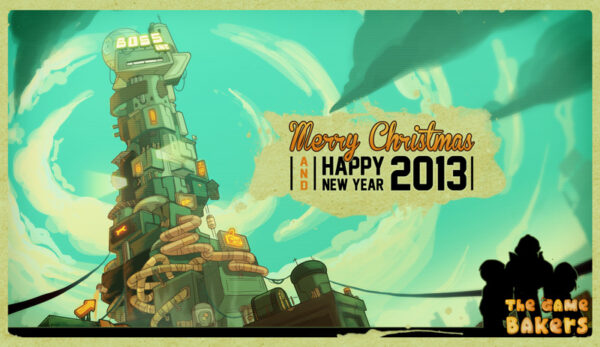
The Game Bakers wish a merry Christmas and a happy New Year to all our beloved players and developers friends! 
We are very happy to announce that the SQUIDS [tentacular] universe just got its first extension today with the launch of the SQUIDS Comics and the first two episodes of SQUIDS To the Edge of the Sea. It was also a great occasion to craft a surprise for our fans: today SQUIDS and SQUIDS Wild West get free updates on the App Store with new content and in particular The Ballad of Clint and Sammo, a mini-comic book in two parts that reveals how the mighty Sammo first crossed path with the most wanted Squids Clint! The comic book dives into that exciting part of the backstory when Steev, Clint and the team set to find the missing Winnick with the hope to stop the Black Torrent for good. But they uncover fragments of Winnick youth that send them to perilous new adventures, tracking the extraordinary crew of a ancient pirate ship on which Winnick was a sailor and discovering some dangerous secrets on the way. The book has been created in collaboration with the talented team at APE Entertainment who already used their magic on properties like Pocket God or Cut the Rope. We are extremely happy with the amazing art and swashbuckling story and confident that it will appeal to fans and comic book lovers as well. SQUIDS Comics for iPhone, iPad, iPod Touch is available today on the App Store for 0.99$ and includes episode 1 and episode 2 for a limited time. Get it here: https://itunes.apple.com/us/app/squids-comics/id575341357?ls=1&mt=8 Check the official press release from APE Entertainment below.
– – – – – Ape Entertainment Brings Aquatic Action to App Store with Squids Comic App SAN DIEGO, Calif. – November 29, 2012 – Ape Entertainment, in association with independent game developer The Game Bakers, today unleashed a wave of adventure onto the App Store—the Squids Comic App for iPhone, iPad and iPod touch. Exploring the backstory of the chart-topping game series, “Squids,” the comic app is priced at $.99, which includes the first issue and, for a limited time, the second issue at no additional cost. Additionally, SQUIDS and SQUIDS Wild West get free updates on the App Store with new content and in particular The Ballad of Clint and Sammo, a mini-comic book in two parts that reveals how the mighty Sammo first crossed path with the most wanted Squids Clint. As for the comic app, Issue No. 1, entitled “SQUIDS: TO THE EDGE OF THE SEA,” dives into the deepest part of the story when our heroes Steev, Clint, and the others investigate the secrets of the missing Winnick to uncover the mystery of the Black Torrent. And what they find kicks off a swashbuckling adventure like none the Seven Kingdoms have ever seen. “We had a blast developing the SQUIDS universe with the input from the talented crew at APE. We are confident the comic book will appeal to fans of the series and to comic book lovers as well,” said Audrey Leprince, The Game Bakers’ COO and cofounder. But wait, there’s more cephalopod-tastic excitement in Issue No. 2, KA-POW! It’s the continuation to our wall-busting first issue. Did Steev get in over his helmet? Can Clint rally the Squids against their Oozy opponents and save Winnick’s home—and its many secrets—from the grasp of the nefarious Baron? Will anybody be able to catch that book-snatching shrimp? Find out when the action continues in SQUIDS: TO THE EDGE OF THE SEA #2! For more information, please visit www.ape-entertainment.com or https://www.thegamebakers.com/. About Ape Entertainment Founded in 2003, Ape Entertainment is the brainchild of lifelong comic book devotees David Hedgecock, and Brent E. Erwin. Ape Entertainment is the comic book home to innovative new titles such as LITTLE GREEN MEN, SCOUTS, and HERO WITHIN. Ape is also the North American publisher for licensed properties THE PENGUINS OF MADAGASCAR, KUNG FU PANDA, RICHIE RICH, CASPER, STRAWBERRY SHORTCAKE, POCKET GOD, and CUT THE ROPE. Visit Ape Entertainment online at http://www.ApeComics.com. About The Game Bakers The Game Bakers is an independent video game studio based in France. Founded and staffed by industry veterans whose credits include numerous AAA console games, The Game Bakers focuses on creative projects that combine traditional gaming values with the best of the mobile experience. Their first game, SQUIDS, has had more than one million downloads since its October 2011 launch and can be enjoyed on iOS, Android, Mac, and PC. A sequel, SQUIDS Wild West, went live on the App Store in June 2012. To learn more, visit the company’s website at https://www.thegamebakers.com. The Game Bakers are also on Facebook (http://www.facebook.com/thegamebakers) and Twitter (http://twitter.com/thegamebakers). ### Media Contacts AppMotionPR for Ape Entertainment Greg Dawson 509-901-7444 greg@appmotionpr.com Audrey Leprince The Game Bakers hello@thegamebakers.comHello, hello, on recherche un Animateur 3D pour des animations de combat / Kung Fu, rendu cartoon. Avec Maya, et à Montpellier si possible ! We are looking for a 3D Animator for Combat / Kung Fu animations, in a toon style. With Maya, and ideally in Montpellier! Contact us hello@thegamebakers.com.
The last time I had a second of free time was over the Christmas holidays and I used that free time to write a paper about our experience making SQUIDS and the realities of budget and profitability for an iPhone game. I wrote this post-mortem because when I started as an indie, I would have loved to have such information and I felt it was useful to share with other developers.
I was amazed by the attention it got and I was very pleased to read all the nice comments about the article. And for those who asked: no, it didn’t have a visible impact on SQUIDS’ sales, but it generated 24k unique visitors to our website in three days, which made the article more visible on Google and made the information more available to the industry, and that’s always a good thing.
There’s something else I would have loved to know more about before diving into indie game development: the tools and best practices for running a virtual indie game studio. By “virtual,” I mean a game development studio that doesn’t have an office. This is a situation shared by many indies: you start your project from home and don’t have the budget for renting an office, or maybe you’re a programmer and you have an artist buddy who lives in a different place. Lack of an office might have been a problem in 1995, but it shouldn’t prevent you from making games anymore. The problem nowadays is that there are so many ways to do it, the idea of running a virtual studio can be overwhelming.
One thing I love about indie development is that it’s not only about having people play our games, but also about developers freely exchanging ideas about our work and methods. So here is a bit of information about how we’ve tackled this issue at The Game Bakers, how we are organized, what tools we’re using at the moment, and how much this stuff costs us.
When I think of a “real” game studio, I think of a traditional office with an open space shared by the development team. I call The Game Bakers a “virtual studio” because we are spread out around the world. The team works together all day, but remotely from different cities, countries, and even different continents.
When I was working at Ubisoft, of course I was working in real offices, but I also had a lot of experience working remotely with other studios. Splinter Cell Double Agent was made by three teams spread across three continents; GRAW was made by four teams in the USA, France, and China.
When we started The Game Bakers, we wanted to make smaller games with a smaller team than we had been at Ubisoft, but we also wanted to create high quality games with good production values, like the console games we had worked on. One of the cornerstones of this ambition was to rely on a network of talented people whom we had worked with before on console games, but who were now spread out all across the world. (Even our initial members in France were not living close to each other.) Working with these talented people we already knew and liked would guarantee better efficiency, higher quality, smoother communication, and it would make our work more fun on a daily basis. To set up a structure that would work for day-to-day operations, we had to draw upon our past experiences with remote collaboration.
Here is our team for SQUIDS and SQUIDS Wild West. Roll over the pictures (or tap them on mobile) to see the team member’s info.
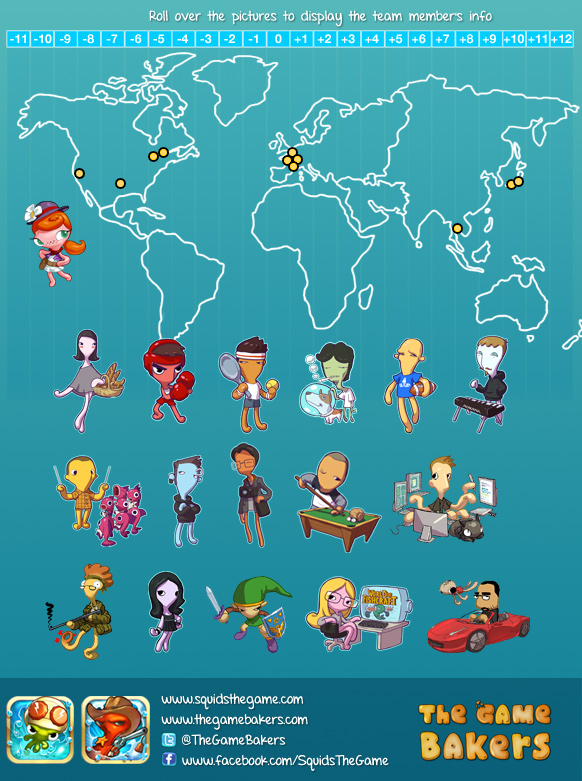
The core team is made up of six people spread out in six cities, in two different countries. The total team is 19 people, five countries, and almost as many workplaces as people on the team.
The core team, working full time on the games, includes:
UI, story, audio, modeling, and PR were handled by part-time coworkers. Most of the team are freelance contractors. Working with contractors instead of employees is convenient in that it saves a bit of money for the studio, but it’s very uncertain as anyone could leave the team anytime. That’s a huge risk for a project where everyone is responsible of a key aspect of the game. One way to reduce this risk is to keep the projects short (shorter than a year). Being extra nice to them also doesn’t hurt. Managing trust is a much more important task in a virtual studio with distant contractors than in an office where everyone is an employee.
Even if you forget the part-time people and just consider the core players, this is pretty big for an indie team and a bit of work and effort is required to keep everyone moving in the same direction. The key word here is communication.
When people ask me, “What’s the most important quality in a game designer?” they often expect me to answer “creativity” or “knowing games” or “understanding both the technical stuff and the art stuff.” But I actually think the most important quality is being able to communicate clearly and to fire up a team with your concept. Programmers are some of the hardest people to get excited about a concept, but if they get all fired up after asking the game designer a question—with shinning eyes and fingers itching to start typing some code—that’s how you know you have a good game designer.
Communicating your vision and having the energy to make it happen is already difficult when your team is all working from the same place, and it can become a huge challenge when you never see these people face to face.
At Ubisoft, I had this great producer who told me once, “If your e-mail is longer than five lines, just pick up the phone and call. E-mails are for cowards, they create misunderstandings and take a long time to write. Just call. Do it!” I started to pay attention and realized that she was absolutely right.
It’s crucial to maintain human relationships with your remote coworkers. Voice chat allows that (in addition to saving time and being a more precise way to communicate). Within the team, we use Skype for instant messaging and conference calls, with a set of guidelines:
This last point is very important. How much someone sees of the big picture can be vastly different from person to person, and there‘s no water cooler where you can catch up with the more “informed” members of a virtual studio. The weekly meeting lasts between 30 to 45 minutes, and everyone is updated and has the opportunity to ask questions.
Cost:
– Gmail account: Free + around $8/year for your own domain name
– Skype or Google Hangouts voice chats: Free
Regarding game design documentation, I’m a big advocate of videos. If I were creating a game design scholarship program right now, I would trash MS Word and replace it with Final Cut and Photoshop. Sharing your vision for a game mechanic or a gameplay loop is way easier with a video. It gives the whole team a concrete direction… and the whole team actually watches it. Who wants to read a 10-page game design document? Not everyone on your team. But everyone wants to watch a one minute game concept video.
Here are examples of early game design documents I did for Squids.
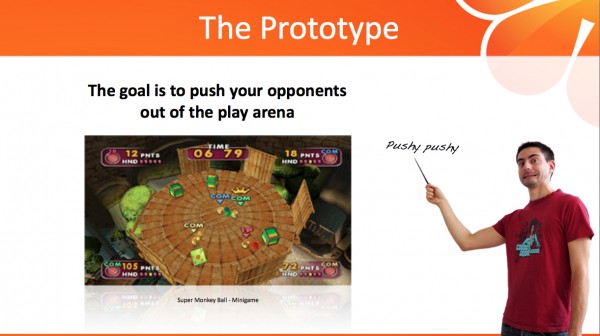
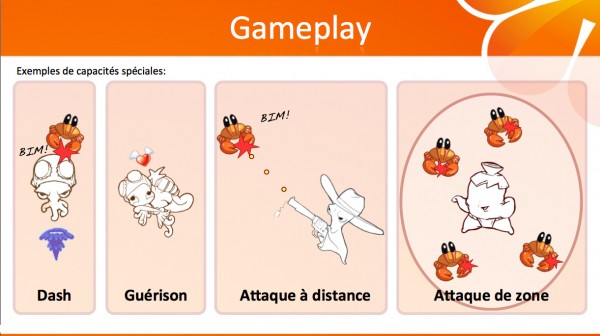
Cost:
– Sharing a video on the Internet: Free
Sharing this video to remote coworkers is super easy and free with YouTube or even password restricted on Vimeo, and is a good example of how much remote work has changed in the last 10 years.
Once I have shared my global vision of the project and I have a set of features in mind, I usually start on the “ugly” documentation, which is more project management actually.
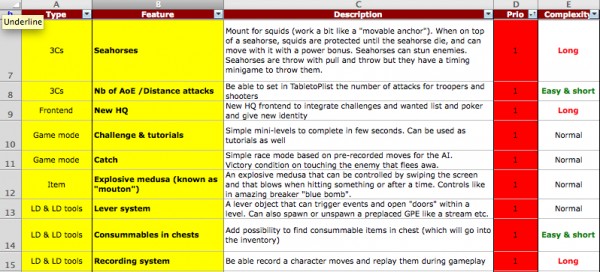
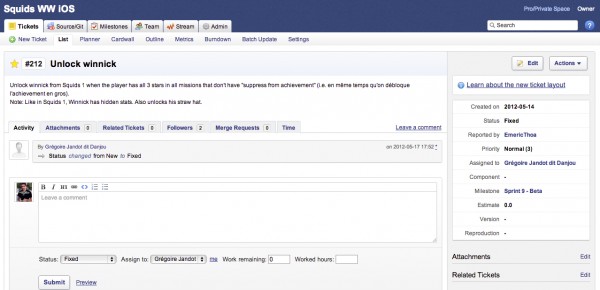
Our use of Assembla is pretty basic. We define milestones that we split into 2-week sprints (a sort of “mini-milestone” with defined objectives and a working version). For each sprint I write a bunch of specs and break them down into tickets. We review them with the programmers at the beginning at a sprint and each ticket has a status: new, fixed, pending, closed. The usual stuff.
This works perfectly for the programmers, since their work is very systematic. For art production, we rely more on a simpler Excel task list and we try to check in on progress twice a week, in order to reprioritize and keep the project moving.
For all videos, documents, and art resources, we use Dropbox. For those who don’t know about Dropbox, it’s a great file hosting and sharing service that basically allows you to share a folder from your computer with others, and syncs it in the Cloud.
For most of the team we managed to increase the default free space (2Gigs) to around 4Gigs, which is enough so far, and for the art and design team we have pro accounts so that they can store bigger files like high-resolution PSDs.
Cost:
– Dropbox 100 Gigs account: $99/year
– Dropbox 2Gigs account: Free (and Dropbox offers a lot of ways to increase the free space).
The code is hosted on Assembla, and we use Git as a source control tool. It’s proven to be very efficient and reliable. One big advantage is that everyone has a repository with complete version history locally on his or her computer, which basically means that I don’t need to be connected to the Internet to commit some work, and most importantly, if I somehow screw up the server data there will always be someone with a clean version that we can restore. For a clumsy designer, it feels safer.
We use GitX on Mac to commit our changes, an open source version control system with a visual interface, but many other tools exist too.
Cost:
– Assembla “Single plan”: $19/month.
– GitX or Github: free.
For beginners, what all this means is that all the team can work at the same time, on the same project, and then merge everyone’s work together on a remote server instead of having to “send manually updated files” to the whole team.
Sharing builds is a universal need within the digital industry and it’s not really any easier or harder for virtual studios, but it is something we needed a solution for.
We have several ways to distribute a development build.
Cost:
– HockeyApp: $25/month.
– TestFlight: Free
Finally, one of the best ways we’ve found to improve remote work is to stop being remote for a while. We call this a Workcamp, and the recipe is pretty simple.
Workcamp recipe, for a 6-8 person team
The values of a Workcamp are numerous:
People get to work together for real, and that bonding will last and prove useful for the next six months of remote work.
It’s also extremely productive if done at the right time. Before an important milestone, work is usually well defined and everyone has a lot to do. We’ve found that in this setting, everyone is fine working 10 hours a day, with a nice lunch break and a little game time at night. For us, a two weeks workcamp is as productive as three weeks of normal work.
It’s simply the spirit. Sharing indie dev time, game time, and food and drink time with your team is always fun, but it’s especially cool when there’s something exceptional about it. The simple fact that the Workcamp breaks the routine makes it cool, and worth the financial investment.
Here is a short sample of our Workcamps:
Cost:
– Transportation: Depends on your team. For us, it’s around $1200.
– Housing: we managed to borrow a place a few times. We rented a great place once for $1500 for two weeks.
– Food: $300 (everyone chips in $10/day, and the studio pays for the rest. Basically, for the wine.)
We also have celebration parties when we ship a game. Here is the “baking / squid cooking workshop” we did after SQUIDS’ release:

Here is a last bit of experience regarding virtual studios:
Pros:
Every week, I find myself in a situation where I really appreciate working from home. For instance, going out to buy something at 11am is something I didn’t do for the 7 years in worked in a company office. Another example is the ability to focus on work for 4 hours without being interrupted. When I was at Ubisoft, I had someone coming to my desk asking for something every fifteen minutes. Lively for sure!
Cons:
Even if the team works well together and everyone’s on board with the virtual studio organization, you will still miss some of the comfort of a real studio. Skype voice chat quality problems might occur, or simply feel the need to draw something on a whiteboard (game designers love white boards). Online white boards have not been a great solution so far.
At first glance it might seem like a virtual studio isn’t worth it, but the point about having a worldwide team alone makes virtual studios a growing necessity: today, making games is frontierless.
“Real studios” are great for many reasons, and sooner or later we might move to some sort of hybrid organization here at The Game Bakers. But so far, the virtual studio has allowed me and my team to follow our dream of creating our own studio, our own games, and own our IPs.
Alongside the “digital distribution,” a virtual studio organization is a major factor for why it’s now possible to make games with total creative freedom and earn a living from it. I hope sharing our methods will help some other indies who might otherwise have been scared off without even trying.
Any questions, feel free to contact me @EmericThoa and for update follow us @TheGameBakers.
Earlier this summer, SQUIDS Wild West launched to great success on
iPhone and iPad—reviewers loved it with a metacritic score of 91 and fans loved it with an average 5-stars review! In today’s free update, the Squids are back with a huge content update that will keep players busy this autumn: – A whole new Chapter in the story, with new maps and adventures in the ruins of Thalas, and Magnus a rather spectacular new Squid to recruit! – The Pro Mode that lets players play the game again with a super high difficulty and a new setup for the enemies. Those who manage to finish the game in Pro Mode will have their name on the Wall of Fame – Optimized for the new iPhone 5. – A secret quest to find 4 hidden helmets. – The Squids can now be leveled up to level 30. – Also in this update: a function to
reset a game as demanded by the fans, and several bug fixes have been included. We also want to spread the word that SQUIDS Wild West amazing original soundtrack from musician Romain Gauthier is available since september, and can be downloaded on iTunes and Bandcamp http://itunes.apple.com/fr/album/squids-wild-west-original/id561511324. SQUIDS Wild West sells for USD $1.99 on the App Store http://itunes.apple.com/app/squids-wild-west/id522145076. SQUIDS fans can befriend the game’s tentacular heroes on Facebook (http://www.facebook.com/squidsthegame) and Twitter (http://www.twitter.com/squidsthegame). 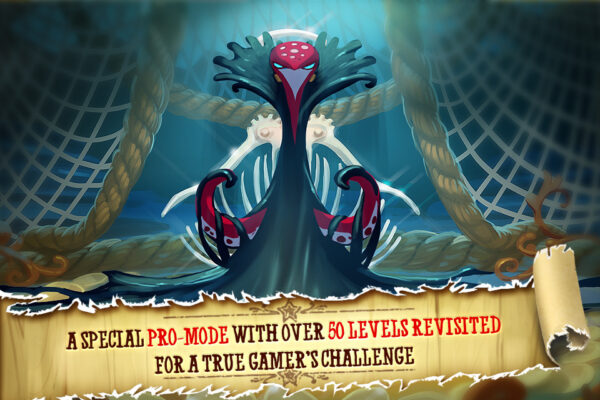
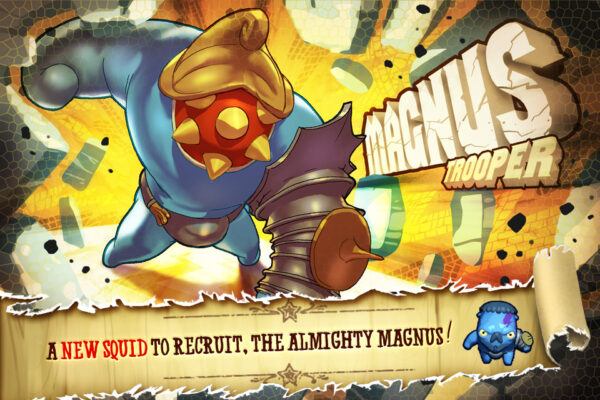
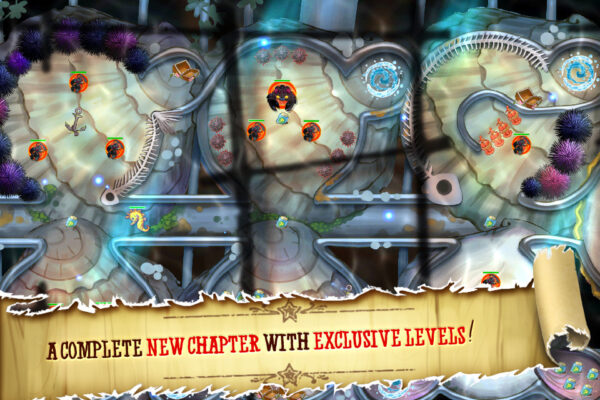
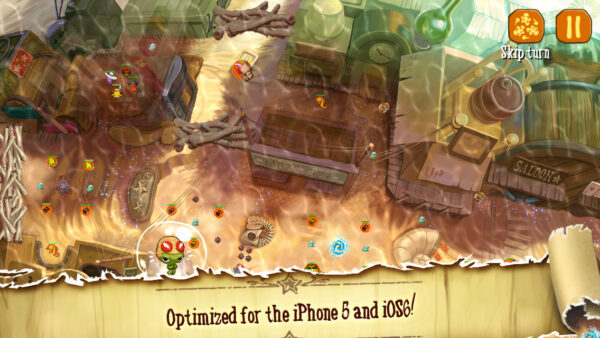
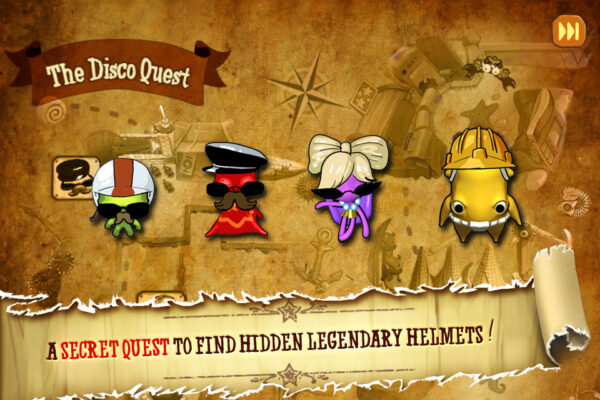
SQUIDS Wild West massive update is just around the corner… You already know about Magnus our epic new Squid included in the update, but the update also includes a whole new chapter, Chapter 6: Little Big Squid, to learn more about him and explore the ruins of Thalas…. 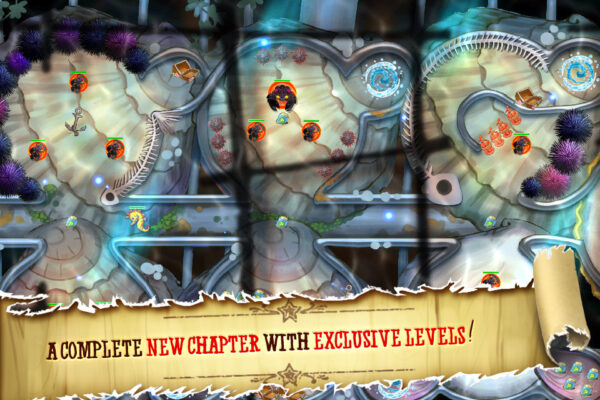
We are looking for some help on our next game. We can’t say much about the game, but of course it will be great and lots of fun to work on as we are pretty nice people at The Game Bakers. Here is the description of the mission. If you are interested contact us at hello@thegamebakers.com Online/Network Programmer for Asynchronous Game You will join our team as a freelancer, and be in charge of developing the solutions for players to play together in an asynchronous way on mobile devices and over the internet, in a cross-platform environment. Mission: – Propose, implement and further develop solutions:
– Debug and correct network issues identified by QC team or beta test – Communicate and document your work to transfer knowledge. Experience: – Experience on games like Draw Something, Words with Friends, Hero Academy. – Ability to work remotely in a cloud based development environment. Mission details: – Mission to start in September 2012 with support needed until launch in February 2012. Exact duration of the mission to be determined with you according to the workload – Our team is dispatched across the world, so you can work from anywhere. Or you can come and visit us in Montpellier, in the South of France! – Fees according to industry standards, to be confirmed with you.
Hey Seawood boys and gals! Wild West has been updated with a lot of bug fixes and 5 new bonus missions, one at the end of each chapter. You’ll also find 4 new helmets hidden in these missions! 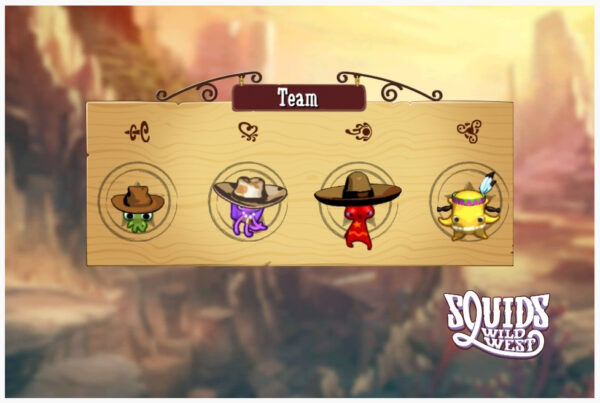 Have fun with the update until we come back with a new chapter in September!
Have fun with the update until we come back with a new chapter in September!
We are very happy – and a little bit proud since we are huge comic book fans – to announce that SQUIDS will be available on Comic Book in a near future. We can’t say much but we will explore much more about our favorite heroes stories, their adventures and their world in the comic book, which is an awesome format for that.
We really believe it is only the beginning of a series of announcement that should rejoice all Squids fans.
Check on our awesome partner APE Entertainment’s site for more information:
http://ape-entertainment.com/2012/07/ape-entertainment-to-develop-comic-series-based-on-popular-squids-mobile-games/
Yes, we are happy to announce that SQUIDS has won this year’s Art Direction Award at the European Indie Game Days. We are especially proud as the competition was tough with many very talented teams and great games. And it was pretty nice to receive the prize on “le vieux port” in Marseille, while the sun was setting down on the mediterranean sea. You should see more coverage in the press (especially French) very soon. 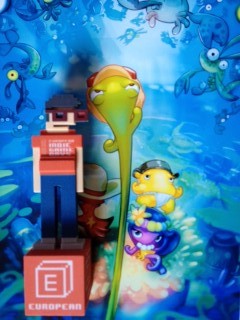 Official press release below. – – – Independent French studio The Game Bakers is proud to announce that their mobile RPG, SQUIDS, has won this year’s Art Direction Award at the European Indie Game Days, which took place July 2-3 in Marseille (http://www.eigd.org). Competing against a hundred of strong contenders produced by indie teams all over Europe, SQUIDS’ colorful graphical style, comical Squid heroes, and visually-rich underwater locations caught the attention of a jury made up of game industry greats (including Jeff Minter and Heather Kelley) to bring home the prize! In SQUIDS, players lead a team of stretchy heroes into epic battles against shellfish that have been infected by a terrible black ooze that threatens the Squids’ lush underwater kingdom. Thanks to its combination of role-playing and tactical gameplay, SQUIDS has won over players by offering a much richer experience than the usual mobile fare. With more than one million downloads so far, SQUIDS was the surprise hit of 2011 and has become a must-have game on iOS platforms. This award comes at the perfect time, because the art style that wowed players, critics, and the EIGD jury has just resurfaced in the latest installment of this epic saga, SQUIDS Wild West! Under the art direction of Jerome Renéaume, The Game Bakers have expanded the imaginative SQUIDS world to include new “old West” locations, new playable Squid characters, and exciting new gameplay. Just one week after its release for iPhone, iPad, and iPod touch, SQUIDS Wild West is climbing the App Store charts worldwide and is poised to follow in the footsteps of the popular original. SQUIDS and SQUIDS Wild West can be found on the App Store at the following links: SQUIDS: http://itunes.apple.com/app/squids/id467904350 SQUIDS Wild West: http://itunes.apple.com/app/squids-wild-west/id522145076
Official press release below. – – – Independent French studio The Game Bakers is proud to announce that their mobile RPG, SQUIDS, has won this year’s Art Direction Award at the European Indie Game Days, which took place July 2-3 in Marseille (http://www.eigd.org). Competing against a hundred of strong contenders produced by indie teams all over Europe, SQUIDS’ colorful graphical style, comical Squid heroes, and visually-rich underwater locations caught the attention of a jury made up of game industry greats (including Jeff Minter and Heather Kelley) to bring home the prize! In SQUIDS, players lead a team of stretchy heroes into epic battles against shellfish that have been infected by a terrible black ooze that threatens the Squids’ lush underwater kingdom. Thanks to its combination of role-playing and tactical gameplay, SQUIDS has won over players by offering a much richer experience than the usual mobile fare. With more than one million downloads so far, SQUIDS was the surprise hit of 2011 and has become a must-have game on iOS platforms. This award comes at the perfect time, because the art style that wowed players, critics, and the EIGD jury has just resurfaced in the latest installment of this epic saga, SQUIDS Wild West! Under the art direction of Jerome Renéaume, The Game Bakers have expanded the imaginative SQUIDS world to include new “old West” locations, new playable Squid characters, and exciting new gameplay. Just one week after its release for iPhone, iPad, and iPod touch, SQUIDS Wild West is climbing the App Store charts worldwide and is poised to follow in the footsteps of the popular original. SQUIDS and SQUIDS Wild West can be found on the App Store at the following links: SQUIDS: http://itunes.apple.com/app/squids/id467904350 SQUIDS Wild West: http://itunes.apple.com/app/squids-wild-west/id522145076
© Copyright The Game Bakers